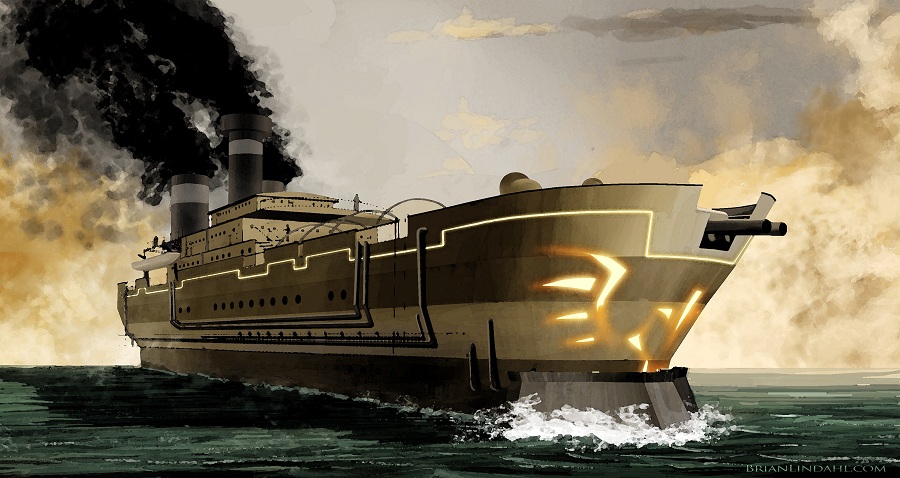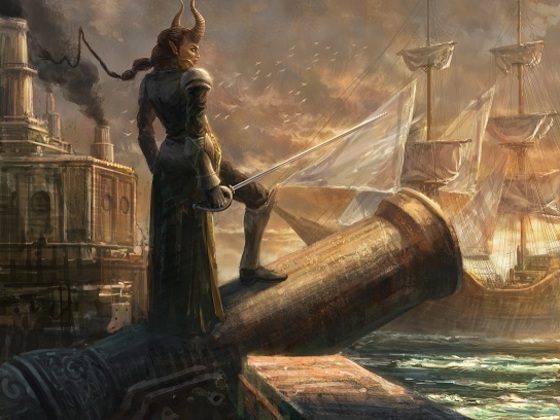(Reposted from the front page news.)
We're producing a short sourcebook for naval adventures in role-playing games, in particular
Dungeons & Dragons and
Pathfinder (and possibly other systems, based on pledges). We'd like your support for our
Kickstarter project.
Many of the most famous explorers and adventurers of history and fiction traveled by ship, but fantasy role-playing games seldom give much love to the high seas. There are whole realms of aqueous action where players and game masters have to fumble along, and since most gamers don't spend their weekends as corsairs it's not easy to just wing it.
We at E.N. Publishing want to sail to the rescue. Our ZEITGEIST Adventure Path includes a wide variety of naval encounters, and we've developed simplified rules for GMs to handle those scenarios quickly. But there are so many more possible adventures at sea than we can fit into our series, so we'd like to expand the quick-play rules into a short sourcebook for naval gaming,
Admiral o' the High Seas.
AotHS will help you to enliven your game with sea chases, boarding actions, broadsides, sea serpents and krakens, triremes capsized by hurricanes, galleons torn apart by maelstroms, windskiffs jousting with dragons, pirate ships prowling the seas for plunder, and maybe even a bit of merchants navigating to unseen shores to seek the booty of foreign lands, if you're into that sort of thing. Those who've only ever seen a masthead when they go to Wikipedia will find enough information about the nature of sailing to fake it in their games. And because we know gamers come in different styles, you'll have quick-to-play options as well as more tactical rules.
(But just to warn the hard-core sail enthusiasts up front, no, we probably won't be 100% accurate. I'm fascinated by the huge variety of sail plans used in different winds, but while real naval engagements might have taken hours, we figure most gamers don't have the patience for true fidelity when they're doing their best Johnny Depp impersonation. Savvy?)
Our staff is already pretty busy working on ZEITGEIST, so we're seeking the support of the gaming community via Kickstarter to cover the costs of art, cartography, and additional writing.
Admiral o' the High Seas will be compatible with
D&D Fourth Edition and
Pathfinder, and depending on our funding we'll consider including conversion notes for other popular game systems.
The first goal, $1000, covers the cost a 32-page book, with a utilitarian array of six ships depicted - trireme, cutter, merchant ship, warship, and steam-powered fantasy warship. Beyond that we can afford more ship maps -- longboats, galleons, ironclads, nautiliuses, airships, windskiffs, and more. If we hit $2000 we'll have the resources to playtest our custom ship-creation system and make sure it's balanced, so your high-level adventurers can cruise around in a heavily armored dreadnought, a swift clipper with a lightning cannon, a sentient airship crewed by ghosts, or the TARDIS.
If we crack $5000, we'll include fleet rules, for when sending
only a hundred men to a watery death just isn't enough. And if we break $10,000, we'll design a bonus adventure for everyone who contributes -- a side-plot of the ZEITGEIST adventure path, but designed to be used in any D&D or
Pathfinder campaign. Anything beyond that will be used to provide more luxurious art and maps for future adventures.
Rewards for contributors come in two main types. For those who have their own campaigns, we're offering printed books and accessories like ship maps, tokens, and nautical charts. For gamers who want to use the naval rules to enrich their ZEITGEIST games, we're offering the chance to make a mark on the setting, winning naming rights and creative involvement with NPCs, locations, and vessels that will show up throughout the campaign.
(A note about the reward packages. While E.N. Publishing is based out of the United Kingdom, the vendors who'll be producing the physical products are in the US, so we ask that non-US supporters include a bit extra to cover the cost of shipping.)
Our top contributors will have sway on what sorts of supplemental material makes it in, like brief vignettes inspired by their own naval games, or descriptions of maritime trade for those who want to evoke that aspect of history. And for those who provide the greatest support, you'll have the chance to game together at Gen Con Indianapolis, in a session run by the writer, Ryan Nock, where we'll smash an actual champagne bottle on something as we name it.
If you've ever longed to have your characters set sail, and been stymied by the lack of easy-to-run naval rules, we're looking for adventurous souls. Hop aboard.





